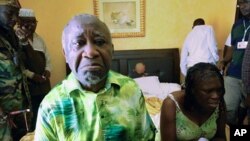Defiant Ivory Coast leader Laurent Gbagbo has been captured at his residence, ending a four-month power struggle in the West African country.
The now-former president surrendered Monday to forces backing the country's internationally-recognized president, Alassane Ouattara. Pro-Ouattara fighters and French special forces advanced on the residence after airstrikes by French and United Nations helicopters on the presidential compound, where Mr. Gbagbo was entrenched with supporters.
Mr. Gbagbo had refused for months to cede power to Mr. Ouattara, the U.N.-certified winner of last November's presidential election.
A spokesman for the U.N. mission in Ivory Coast says about 300 members of Mr. Gbagbo's guard surrendered ahead of their leader's capture. He also says no U.N. personnel were involved in the final assault.
Mr. Gbagbo and his wife are now being held at Mr. Ouattara's headquarters, Abidjan's Golf Hotel. The U.N. peacekeeping chief, Alain Le Roy, says Mr. Gbagbo is being held by Mr. Ouattara's forces but asked for and received U.N. protection.
Mr. Ouattara's television station showed images of a tired-looking Mr. Gbagbo in a hotel room, wearing a white T-shirt and surrounded by several people.
Mr. Ouattara's prime minister, Guillaume Soro, told French television that pro-Ouattara forces are now working to secure Abidjan. He called on the remaining pro-Gbagbo forces to stop fighting and switch sides.
Meanwhile, a spokesman for the pro-Ouattara forces said that operations are underway to find key Gbagbo supporters such as youth leader Charles Ble Goude.
French and U.N. helicopters initially struck pro-Gbagbo positions in Abidjan last Monday. U.N. chief Ban Ki-moon said the attacks were meant to prevent Gbagbo forces from attacking civilians with mortars and other heavy weapons.
Abidjan has endured more than four months of fighting between Gbagbo and Ouattara supporters since the election dispute began in early December. The U.N. said the conflict displaced some 1 million Ivorians, with more than 100,000 fleeing to neighboring Liberia.
Mr. Gbagbo had been president of Ivory Coast since being named the winner of the disputed 2000 election. He survived a 2002 civil war that split the country into rebel and government-controlled areas.
Mr. Gbagbo then stayed in power more than five years past his mandate, as elections were repeatedly postponed.
Ivory Coast's Gbagbo Captured, Taken to Ouattara HQ




